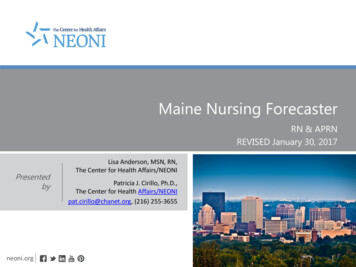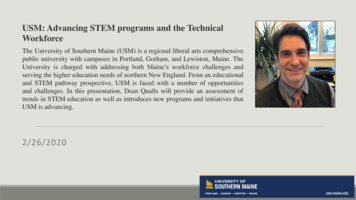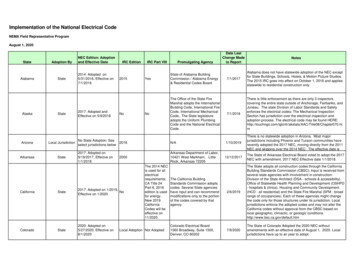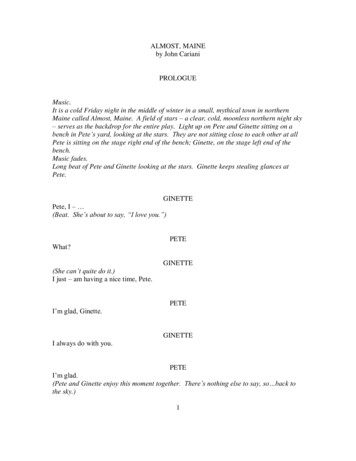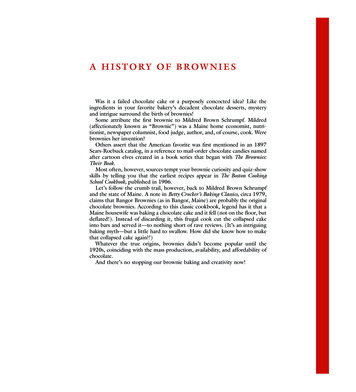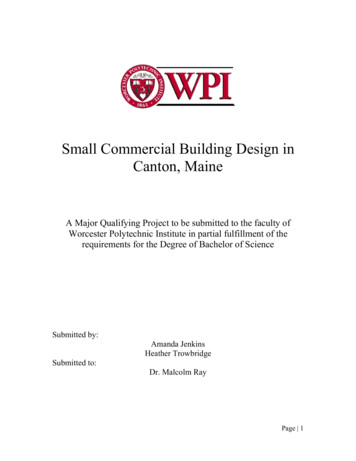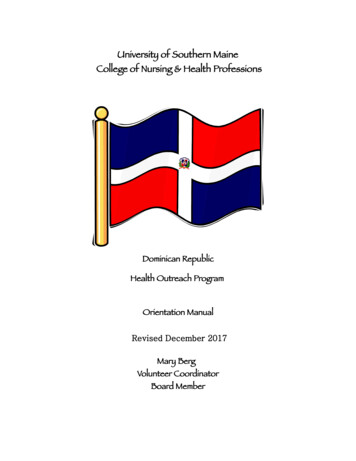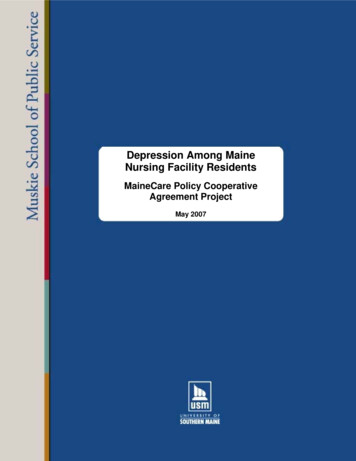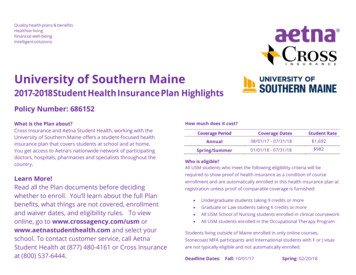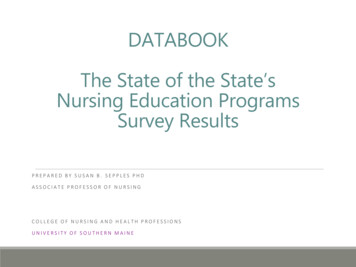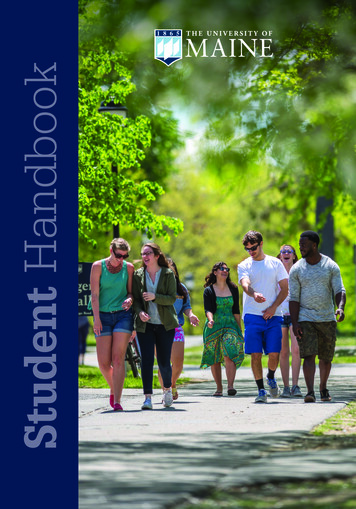
Transcription
Student Handbook
Table of contentsIntroduction. . . . . . . . . . . . . . . . . . . . . . . . . . . . . . . . . . . . . . . . . . . . . . . . . . . . . . . . 3Equal Opportunity Policy. . . . . . . . . . . . . . . . . . . . . . . . . . . . . . . . . . . . . . . . . . . . . . 7Institutional Accreditation Information . . . . . . . . . . . . . . . . . . . . . . . . . . . . . . . . . . 13Academics. . . . . . . . . . . . . . . . . . . . . . . . . . . . . . . . . . . . . . . . . . . . . . . . . . . . . . . . 19Policies and Regulations Links. . . . . . . . . . . . . . . . . . . . . . . . . . . . . . . . . . . . . . . . . 21Policies and RegulationsAcceptable Use of Information Resources . . . . . . . . . . . . . . . . . . . . . . . . . . . . . 22Accommodation Policy for Students with Disabilities. . . . . . . . . . . . . . . . . . . . . 26Alcohol Beverage and Drug Policies. . . . . . . . . . . . . . . . . . . . . . . . . . . . . . . . . . 27Banner/Flag Policy . . . . . . . . . . . . . . . . . . . . . . . . . . . . . . . . . . . . . . . . . . . . . . . 38Facilities Use Policy. . . . . . . . . . . . . . . . . . . . . . . . . . . . . . . . . . . . . . . . . . . . . . . 40First Year Residence Requirement. . . . . . . . . . . . . . . . . . . . . . . . . . . . . . . . . . . . 41Free Speech and Assembly Policy. . . . . . . . . . . . . . . . . . . . . . . . . . . . . . . . . . . . 42Hazing Policy . . . . . . . . . . . . . . . . . . . . . . . . . . . . . . . . . . . . . . . . . . . . . . . . . . . 45Inclement Weather Policy. . . . . . . . . . . . . . . . . . . . . . . . . . . . . . . . . . . . . . . . . . 47Missing Student Policy and Protocol. . . . . . . . . . . . . . . . . . . . . . . . . . . . . . . . . . 48Name Usage Policy. . . . . . . . . . . . . . . . . . . . . . . . . . . . . . . . . . . . . . . . . . . . . . . 50Nonsexist Language Policy. . . . . . . . . . . . . . . . . . . . . . . . . . . . . . . . . . . . . . . . . 53Parental Notification Policy . . . . . . . . . . . . . . . . . . . . . . . . . . . . . . . . . . . . . . . . 54Posting, Chalking and Distribution of Informational Materials Policy. . . . . . . . . 56Scheduling Events on Campus. . . . . . . . . . . . . . . . . . . . . . . . . . . . . . . . . . . . . . 62Student Administrative Appeal Policy. . . . . . . . . . . . . . . . . . . . . . . . . . . . . . . . . 63Student Military Mobilization and Activation Policy. . . . . . . . . . . . . . . . . . . . . . 66Student Organization Administration Policy. . . . . . . . . . . . . . . . . . . . . . . . . . . . 70Student Risk Assessment and Safety Intervention Policy . . . . . . . . . . . . . . . . . . 77Student Travel Policy. . . . . . . . . . . . . . . . . . . . . . . . . . . . . . . . . . . . . . . . . . . . . . . 8Tobacco and Smoke Free Policy . . . . . . . . . . . . . . . . . . . . . . . . . . . . . . . . . . . . . 89Weapons Policy . . . . . . . . . . . . . . . . . . . . . . . . . . . . . . . . . . . . . . . . . . . . . . . . . 94The University of Maine does not discriminate on the grounds of race, color, religion, sex, sexual orientation, includingtransgender status and gender expression, national origin, citizenship status, age, disability, genetic information or .veteran status in employment, education, and all other programs and activities. Contact the Director, Equal Opportunity,5754 North Stevens Hall, Room 101, Orono, ME 04469-5754 at 207.581.1226 (voice), TTY 711 (Maine Relay System),equal.opportunity@maine.edu with questions or concerns.
Message from the VicePresident of Student LifeOn behalf of the staff and students whowork in student affairs, I welcome you tothe University of Maine.The remarkable beauty of this place, thededication of our faculty and staff, thediversity of your fellow students all holdgreat promise for you. I urge you to be morethan a spectator; rather, take full advantageof the opportunities here. The University ofMaine can be and is a wonderful place tolive, to study, and to learn.Let me point out that as a citizen of the University of Maine community,you have both rights and responsibilities. We take seriously the assuranceof these rights for every member of the community. Likewise, we expecteach community member to fulfill his or her responsibilities. This studenthandbook is designed to help you understand what you can expect of theUniversity of Maine and what the University of Maine expects of you. Inparticular, I wish you to take some time and familiarize yourself with thestudent conduct code.Finally, remember one thing. There is someone here to help whenever youneed it. Whether it be your academic advisor, a resident assistant in yourresidence hall, an officer at UMaine Police Department, another student,the Dean of Students, there is always someone to help. Make sure you ask.Do good work and enjoy the University of Maine.Robert Q. DanaVice President for Student LifeDean of Students
2Student Handbook
IntroductionEstablished in 1865, the University of Maine is the flagship universityof the University of Maine System. It is also the state’s designated landgrant and sea-grant institution. Within the System, UMaine has uniqueresponsibilities for providing high quality undergraduate and graduateeducation programs, basic and applied research, and statewide publicservice outreach. Its fundamental purpose is to provide a world-classeducation, and, through research and outreach, help create the kind ofstate where citizens can put their education to work at the highest andmost rewarding level.Located in Orono between the Penobscot and Stillwater rivers and withinclose proximity to the ocean, lakes and mountains, UMaine offers aninspiring learning environment. At the center of campus is The Mall, anopen, tree-lined quadrangle. Some of the most distinctive buildings oncampus border The Mall, including the Raymond H. Fogler Library andthe Stevens Hall complex. The renovated Lord Hall offers gallery space andclassroom facilities for UMaine’s art department. Class of 1944 Hall, hometo UMaine’s School of Performing Arts, is considered one of the finesteducational facilities of its kind in the Northeast. The Advanced EngineeredWood Composites Center is a one-of-a-kind facility where students andfaculty members develop new and expanded products and processes. Similarexamples of top-notch facilities may be found in every corner of UMaine’s660 acre campus.The University of Maine maintains the look and feel of a traditional NewEngland institution of learning while featuring modern research facilities.UMaine’s undergraduate and graduate academic programs are built upona liberal arts and sciences foundation while also featuring professionoriented education in a wide range of disciplines, many of which arefound nowhere else in the state. Because of their responsibility to teach,conduct research and serve the public, UMaine’s faculty incorporate thenew knowledge they gain with classroom activities, often giving studentshands-on experience in research activities, business and communityassistance and public service.Student Handbook3
IntroductionMany of UMaine’s engineering, business, science, liberal arts, and naturalresources programs have gained national and international respect. Some ofthe world’s most creative minds have been attracted to UMaine because ofits reputation for excellence and accomplishment.As a public university, the University of Maine strives to make its programsand services of the highest quality while remaining affordable and accessible.The size of the student population makes it the largest in the state, yet it isstill small enough to promote a sense of familiarity among members of thecampus community.Outstanding cultural and athletic programs and opportunities exist for bothactive participants and spectators. Minsky Recital Hall features both highquality performance areas and a digital recording studio for use by studentsand faculty. UMaine’s Museum of Art and Hudson Museum feature worksand artifacts of international renown. UMaine’s Collins Center for theArts serves as a cultural hub for much of Maine, bringing high-qualityperformances to the central part of the state.UMaine’s Alfond Sports Arena and surrounding athletic facilities are hometo the state’s only NCAA Division I athletics program, including theUMaine Black Bear hockey team, the 1993 and 1999 national champions,and the highly popular UMaine women’s basketball team. Morse Field atthe 10,000-seat Alfond Stadium, which opened in September 1998, is hometo UMaine’s football and field hockey teams. Combined, these culturaland athletic programs and opportunities enhance the student learningexperience while benefiting the people of the region and state.In day-to-day activities as well as overall direction, the University ofMaine exemplifies many of the values often identified with the State ofMaine: a strong work ethic, community and state pride, self-reliance, andenvironmental sensitivity.4Student Handbook
IntroductionUMaine’s goals Helping Maine and the nation solve their most pressing needsGenerating and disseminating new knowledgePreparing students for life, work, citizenship and change in the 21stcenturyResponsible stewardship of university resourcesEditorial policyThe University of Maine reserves the right to revise, amend, or change itemsset forth in the student handbook from time to time. Accordingly, readersof the student handbook should inquire as to whether any such revisions,amendments, or changes have been made since the date of publication.Last updated: October 2018Student Handbook5
6Student Handbook
Equal Opportunity PolicyIn complying with the letter and spirit of applicable laws and inpursuing its own goals of diversity, the University of Maine shallnot discriminate on the grounds of race, color, religion, sex, sexualorientation, national origin, citizenship status, age, disability, orveterans status in employment, education, and all other areas of theUniversity. The University provides reasonable accommodations toqualified individuals with disabilities upon request.The University will regard freedom from discrimination anddiscriminatory harassment as an individual employee and studentright which will be safeguarded as a matter of policy. Any employee orstudent will be subject to disciplinary action for violation of this policy.Retaliation against anyone who makes a complaint of discriminationor harassment or who is involved in a complaint process will not betolerated.Questions and complaints about discrimination in any area of theUniversity should be directed to the executive director of equalopportunity, University of Maine, 5754 North Stevens Hall, Room101, Orono, ME 04469-5754; umaine.edu/eo; 207.581.1226 (voiceand TTD).Equal opportunity complaint procedureThe University of Maine is committed to maintaining a respectful,fair educational and work environment, free from discrimination orharassment that violates our policy prohibiting discrimination basedon race, color, religion, sex, sexual orientation, national origin orcitizenship status, age, disability, or veterans status. The University ofMaine has an equal opportunity complaint procedure to deal promptlyand fairly with concerns and complaints about discrimination orharassment. The procedure may be used by any student or employeewho believes that he or she has been discriminated against or harassedbased on race, color, religion, sex, sexual orientation, national origin orcitizenship status, age, disability, or veteran status. Sexual discriminationcomplaints alleging discrimination based on marital status, pregnancy,or parental status may also be raised through this procedure.Student Handbook7
Equal opportunity policyAnyone may bring information or a concern about discrimination orharassment to the executive director of equal opportunity, University ofMaine, 101 North Stevens Hall; 207.581.1226. Any employee or studentwho feels that he or she has experienced discrimination or harassment, andanyone with knowledge of an incident, should contact his or her supervisoror the EO director as soon as possible after the incident. The complainantand the person accused have certain rights to representation during thecomplaint process, which includes the right to be accompanied by agrievance representative for an employee who is a bargaining unit member.Any supervisor who becomes aware of the problem should promptly consultwith the executive director of equal opportunity. If the executive directorof equal opportunity files a complaint, is the subject of a complaint, orhas a substantial conflict of interest regarding the complaint or the personaccused, an alternate investigator may be requested.8Student Handbook
Equal opportunity policyThe executive director of equal opportunity discusses informal and formaloptions for resolving the problem. Complaints are handled as confidentiallyas possible to protect the rights of both the complainant and the personaccused. Retaliation against anyone who makes a complaint or participatesin a complaint process will not be tolerated.The goal of the informal process is to seek a resolution acceptable toeveryone involved. Most concerns can be addressed through the informalprocess, which provides the maximum privacy and an opportunity for theearliest possible resolution.If the complainant chooses or if a problem cannot be resolved informally,the complainant may request a formal investigation. When the personaccused of discrimination or harassment is a student and a formal complaintis filed, the Office of Community Standards, Rights and ResponsibilitiesStudent Handbook9
Equal opportunity policyconducts the investigation according to the procedure in the StudentConduct Code. When the person accused is an employee, the executivedirector of equal opportunity assesses whether the University’s policyprohibiting discrimination or harassment has been violated and notifies thecomplainant, the person accused, and the responsible administrator. Theadministrator is responsible for taking action on the findings and makingdecisions about corrective or disciplinary action.Under certain circumstances, either the complainant or the person accusedmay appeal the executive director of equal opportunity’s findings or theresponsible administrator’s decision to the equal opportunity coordinatorfor the University of Maine System. The equal opportunity coordinatorreports the result of the review to those directly involved, the campusexecutive director of equal opportunity, the responsible administrator, andthe President. The final decision on an appealed complaint is made by thePresident.10Student Handbook
Equal opportunity policyStudents, staff, and faculty are encouraged to use this procedure to raiseconcerns or complaints, but may choose instead or in addition to filea grievance (for employees) and/or a complaint with the appropriategovernment agency.The complete complaint procedure is available through the Office of EqualOpportunity, 101 North Stevens Hall.Financial and Academic PoliciesThe financial requirements of the University, changing costs, state andlegislative action, and other matters may require an adjustment of thesecharges and expenses. The University reserves the right to make suchadjustments to the estimated charges and expenses as may from time to timebe necessary in the opinion of the Board of Trustees up to the date of finalregistration for an academic term. The applicant acknowledges this reservationby the submission of an application for admission or by registration.The University reserves the right to cancel offerings, to set minimum andmaximum sizes of classes, to change designated instructors in courses, andto make decisions affecting the academic standing of anyone participating ina course or program offered by the University of Maine.Student Handbook11
12Student Handbook
Institutional AccreditationInformationThe University of Maine is one of the nation’s major publicinstitutions of higher education, but built on a human scale. Its fiveundergraduate colleges together enroll about 9,000 students, andits graduate school enrolls about 2,250 students seeking masters ordoctoral degrees. The University of Maine is the center for researchand graduate education in Maine. In addition to the 88 baccalaureatedegree programs, UMaine offers 64 masters and 25 doctoralprograms that attract students from around the world, helping tocreate a cosmopolitan university environment in a rural New Englandsetting. The University of Maine is a place of discovery. The researchand scholarship of its approximately 800 faculty members and 2,250graduate students greatly enrich the undergraduate classroom. Thisspells the difference between a research university, where studentslearn by being caught up in the creation of knowledge, and othertypes of schools where research is not performed.The University of Maine enjoys an ideal physical setting on the banksof the Stillwater River (a branch of the Penobscot) in Orono. It is tenminutes from Maine’s third largest city (Bangor) and an internationalairport. It is also adjacent to an interstate highway (I 95), only anhour from Bar Harbor and Acadia National Park, and within an easydrive of several major ski resorts. And yet, despite these convenienttravel connections, it sits at the edge of the last great expanse ofundeveloped lakes, forests, and streams in the Northeast.The University of Maine has a rich heritage. The Maine legislatureestablished it in 1865 under the provisions of the land-grant actsigned by President Abraham Lincoln. That law gave federal landsto each state that would agree to use the income from those lands toestablish what was then a new kind of educational institution, onededicated to educating the sons of average citizens in “agriculture andthe mechanic arts”. In the 150 years since its founding the Universityof Maine has grown far beyond its original focus on agriculture andengineering, and today enrolls slightly more women than men. Twoof its colleges — Engineering; and Natural Sciences, Forestry, andStudent Handbook13
Institutional accreditation informationAgriculture — still embody elements of its original mission, but tailored tomeet the needs of the 21st century through programs like computer andelectrical engineering and molecular biology. The University’s three othercolleges — Education and Human Development; Liberal Arts and Sciences;and Business, Public Policy and Health — offer programs undreamed-of in1865: studio art, computer science, business administration, new media,child development and family life, social work, communication sciences anddisorders — and the list could go on and on.The University of Maine remains true to its land-grant heritage in yetanother important way: it is committed to public service and to improvingthe quality of human life. Its faculty members, its staff members, and itsundergraduate and graduate students all contribute to improving our societythrough research, education, and direct community service. By enrolling atthe University of Maine students are committing themselves to working fora better, more just, more tolerant society.14Student Handbook
Institutional accreditation informationThe University of Maine is not just a place to prepare yourself for a goodjob: it is that, but it’s also a place to prepare yourself for a rich and fulfillingLIFE. The curriculum helps with part of this preparation. Each programis based upon a foundation in the liberal arts and sciences to ensure thatUniversity of Maine graduates are broadly educated persons who cancontribute in many ways beyond their technical expertise. But a big part ofthis liberalizing education takes place outside the classroom by immersion ina university community that celebrates the arts, treasures the truth, defendsfreedom of thought and expression, and cherishes human racial, ethnic, andcultural diversity.The University of Maine enjoys overall institutional accreditation by theNew England Association of Schools and Colleges, Inc., the oldest regionalaccrediting association in the United States. Many professional societies alsoconfer accreditation or approval on specific University of Maine programs.Student Handbook15
Institutional accreditation informationAccredited programs include: 16AACSB — The International Association for Management Education(Programs in Business Administration)The Accreditation Board of Engineering and Technology, Inc.(All baccalaureate programs in Engineering and in Engineering Technology)The American Chemical Society(The BS and BA in Chemistry)The American Dietetic Association(Baccalaureate and masters programs in Food Science and Human Nutrition)The American Psychological Association(Doctoral program in Psychology)The Council on Academic Accreditation in Audiology and SpeechLanguage Pathology (CAA) of the American Speech-Language-HearingAssociationThe Commission on Collegiate Nursing Education(BS in Nursing, MS in Nursing, post graduate APRN certificate)Student Handbook
Institutional accreditation information The Computing Sciences Accreditation Board(BS in Computer Science)The Council on Social Work Education(All programs in Social Work)The National Association of Schools of Music(Programs in the School of Performing Arts)The National Association of Schools of Public Affairs and Administration(Masters program in Public Administration)The National Council for Accreditation of Teacher Education(All programs in Education)The Society of American Foresters (All programs in forestry)The Society of Wood Science and Technology(BS in Wood Science and Technology)Student Handbook17
18Student Handbook
AcademicsBelow is a list of academic policies. To access the full policy, consult thecurrent Undergraduate Catalog which can be found on the Student Recordswebsit at catalog.umaine.edu: Academic AchievementsAcademic CalendarAcademic IntegrityAcademic Progress Policy for Financial AidAcademic StandingAdd and Drop (schedule changes)Appealing Grades and AssignmentsApplication for GraduationAthletic Events During Final Examination PeriodAwarding of DegreesAway StatusClass Meetings/CancellationsConfidentiality (FERPA)ExaminationsGeneral Education RequirementsGrades and GradingImmunization LawLeave of AbsenceRegistration (enrollment information)Transcripts of Academic RecordTransfer of Academic CreditWithdrawal from the UniversityStudent Handbook19
20Student Handbook
Policies and RegulationsBelow are a list of links which will bring you to the appropriate page: Acceptable Use of Information ResourcesAccommodation Policy for Students with DisabilitiesAlcohol Beverage and Drug PoliciesBanner/Flag PolicyCLERY Annual Security Report (External Link)Facilities Use PolicyFirst Year Residence RequirementFree Speech and Assembly PolicyHazing PolicyHumane Care of Animals (External Link)Inclement Weather PolicyLicensing, Logos and Trademarks (External Link)Missing Student PolicyName Usage PolicyNonsexist Language PolicyParental Notification PolicyPosting, Chalking and Distribution of Informational Materials PolicyParking Rules and Regulations (External Link)Protection of Human Subjects of Research Policy (External Link)Research Compliance (External Link)Resident’s Guide to Campus Living (External Link)Safety and Environmental Management Polices(Event Management, Drone, etc.)Scheduling Events on CampusSex Discrimination, Sexual Harassment, Sexual Assault,Relationship Violence, Stalking and Retaliation (External Link)Student Administrative Appeal PolicyStudent Conduct Code (External Link)Student Military Mobilization and Activation PolicyStudent Organization Administration PolicyStudent Risk Assessment and Safety Intervention PolicyStudent Travel PolicyTobacco-and Smoke Free PolicyWeapons PolicyStudent Handbook21
UNIVERSITY OF MAINE POLICIES & RECOMMENDATIONS:ACCEPTABLE USE OF INFORMATION RESOURCESPreambleThe University of Maine System (all of its Campuses and subordinate components)endeavors to develop and provide access to collections, services, facilities,equipment, and programs which meet the information and educational needs ofthe University community, and to advance the research, instruction, and servicemissions of UMS.In fulfillment of this purpose, and in response to advances in technology and thechanging needs of the community, UMS supports open access to informationresources, including the Internet, to the greatest extent possible. In return,the University expects users of information resources to be aware of and act incompliance with all relevant federal and state laws, local ordinances, and Universitypolicies. It further expects its users to be familiar and to behave consistently withthe several general principles which together constitute appropriate, responsible,and ethical behavior in an academic environment, particularly in regard to theuse of the University’s information resources. Those principles include Freedom ofExpression, Respect for Privacy, Respect for Property Rights, Respect for Personaland Cultural Differences, Freedom from Harassment, Respect for and Compliancewith Intellectual Property Rights and Copyright Law.While the University of Maine System respects the need for privacy, users canexpect the files and data he or she generates to be private when information systemsare functioning properly unless they have taken action to reveal it to others. Theuser should be aware that no information system is completely secure as thereconstant attempts to compromise these systems by external parties and others. TheUniversity of Maine System affirms that it will be a partner with users in promotingeducation and understanding of the appropriate, efficient, and successful use ofinformation resources.ResponsibilitiesAll users of the University of Maine System information resources are expected tobehave responsibly, legally, and ethically in their use of all information resources. Tothat end, it is the responsibility of those users to: 22Student HandbookHonor all state and federal laws, copyright provisions, Board of Trusteespolicies, and software licensing agreements to which the institution is aparty
Be aware of and comply with the University and the University’s agencies’procedures and regulations for accessing and operating the computer andrelated hardware, software, and other information resources; Cooperatewith legitimate requests by University staff Take precautions to protect accounts and passwords by selecting obscurepasswords, changing them frequently, and not sharing such info Download information from computers to disk whenever possible, andlimit printing and photocopying to what is directly needed in order toconserve paper and to make the most efficient use of resources Properly logoff or log out whenever leaving a computer in an area which isaccessible to others Treat others with dignity and respect; respect the privacy andconfidentiality rights of others, including their files and accounts; useUMS information resources only for purposes which are legal andconsistent with the University’s mission.Consistent with the above, unacceptable uses and behaviors include, but arenot limited to: Damaging or attempting to alter computer equipment Violating, or attempting to violate computer system security Violating, or attempting to violate software license agreements Incurring unauthorized or unreasonable costs for the University Accessing files, data, or passwords of others without authorization Disrupting or monitoring electronic communications withoutauthorization Harassing other computer users or University staff Violating the privacy of others Libeling or slandering others Using any University workstation for any illegal purpose Copying or distributing copyright-protected material without legal rightor authorization Information Technology Assets (Desktops, Mobile Devices, etc.) providedto employees (Faculty and Staff) are for University Business and limitedpersonal use consistent with Board Policies on Intellectual Property andConflict of Interest (www.maine.edu/system/policy manual/policysection410.php).Student Handbook23
Results of Inappropriate Behavior:It is important to recognize that inappropriate behavior has an adverse effect onthe work of others, on the ability of University staff to provide good service, and/oron information resources themselves. Thus it is expected that users of informationresources at the UMS will be constructively responsive to others’ complaints, andreceptive to University staff’s reasonable requests for changes in behavior or action.University staff will attempt to resolve differences and problems among informationusers by asking for the cooperation of those involved, and for compliance withUniversity policies.The University will pursue infractions or misconduct that cannot be resolvedinformally with the general means it has available to it within the Un
handbook is designed to help you understand what you can expect of the University of Maine and what the University of Maine expects of you. In particular, I wish you to take some time and familiarize yourself with the student conduct code. Finally, remember one t
